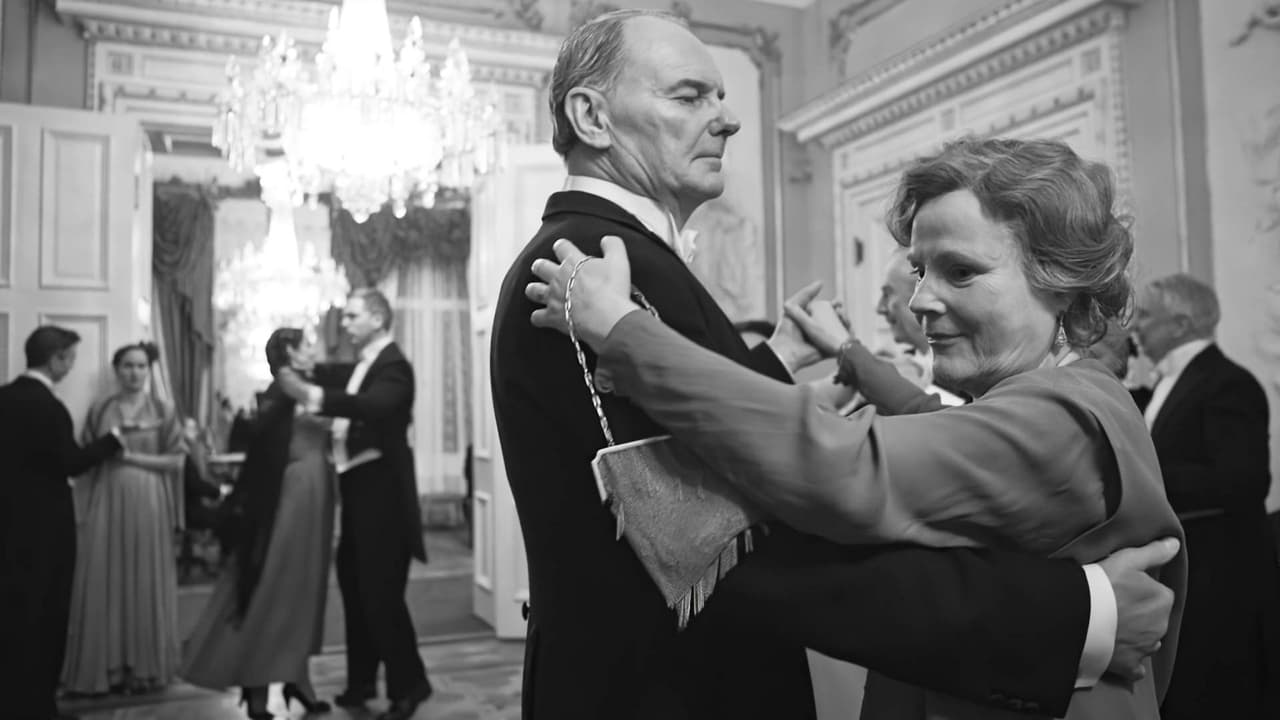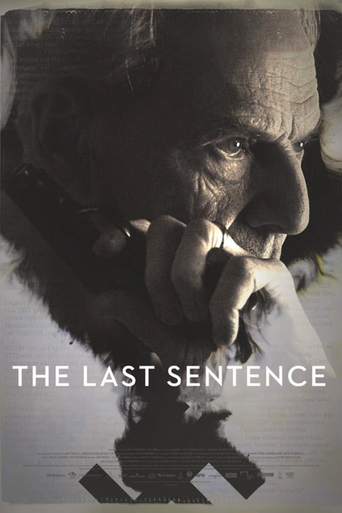

One of the best films i have seen
... View MoreAlthough it has its amusing moments, in eneral the plot does not convince.
... View MoreI gave this film a 9 out of 10, because it was exactly what I expected it to be.
... View MoreIt's an amazing and heartbreaking story.
... View MoreThe key to this film lies, in part, in understanding the meaning of the title. "The Last Sentence" is an ambiguous translation of the Swedish because a "last sentence" might refer to the last words a man writes. Instead, "sentence" here means the "judgment" one passes on a man who has died--a judgment that endures longer than the judgments that were passed on a man while he was alive.And this citation of the "Hávamál" (an Old Norse 13th-century poem) has a special resonance in light of a toast proposed by Torgny Segerstedt early in the film: Segerstedt remarks something to the effect that we have a sacred duty to tell the truth in public matters, but no such duty in our private affairs.Jan Troell has thus given us a portrait of Torgny Segerstedt as a man who fiercely refused to say anything other than the truth about Hitler and Nazism, but who, at the same time, was incapable of acting in a truthful and caring fashion in his private life--a man who seemingly had a deeper attachment to his dogs than to any of the people who deeply loved him. And Troell has perhaps highlighted the shortcomings in Segerstedt's personal relationships precisely because he wants the viewer to sense this tension in the final judgment we place on the life of a man. Do Segerstedt's attempts to stir the conscience of the Swedes through his writings on the horrors of Nazism cancel out whatever negative judgment we might pass on his conduct as a father, husband or lover? Maybe Troell poses just such a question because he himself may sense that he's nearing the end of his own life. And so what Troell wants, perhaps, is for us to realize that we are all faced with the question of the measure of a person's life and the final judgment to be passed on that life: what weight to give to the life one has lived in public, visible to all, or to the life that one has lived in the shadows (filled with love and affection or not) of one's private life?
... View MoreSwedish cinematographer, screenwriter and director Jan Troell's thirteenth feature film which he co-wrote with Danish screenwriter Klaus Rifbjerg, is based on a biography about Swedish publicist Torgny Segerstedt from 2007 which was written by Swedish writer, actor and director Kenne Fant. It premiered at the 23rd Stockholm International Film Festival in 2012, was shot on location in Luleå, Gothenburg and Stockholm in Sweden and is a Sweden-Norway co-production which was produced by Swedish producer Francy Suntinger. It tells the story about Torgny Segerstedt, an editor-in-chief of a daily newspaper called Göteborgs Handels- och Sjöfartstidning who lives in Gothenburg with his wife Puste, their daughter Ingrid and his three dogs. Torgny is a strong opposer of the reigning regime in Germany which is questioned by many and he often attends upper-class parties with Puste who mostly stays in the background and observes him and his lover Maja Forssman.Precisely and brilliantly directed by Swedish filmmaker Jan Troell, this finely tuned biographical story which is narrated from multiple viewpoints though mostly from the main character's point of view, draws a mindful portrayal of a Swedish theologian in his late fifty's and his relationship with his Norwegian wife, a married Jewish woman and his somewhat lonely battle against the German national socialism. While notable for its naturalistic and distinct milieu depictions, distinct black-and-white cinematography by Jan Troell and Swedish cinematographer Mischa Gavrjusjov, production design by Swedish production designers Pernilla Olsson and Peter Bävman, fine costume design by Swedish costume designer Katja Watkins, editing by Jan Troell and film editor Ulrika Rang and use of sound, this character-driven and historic drama depicts a nuanced and involving study of character and contains a great score by Norwegian composer Gaute Storaas.This tangible, romantic, political and conversational tale about a truly dedicated anti-Nazi who some thought would jeopardize the national security of Sweden due to his outspoken publications about Nazism and possibly drag his country into the war, is set in West Sweden before and during the Second World War in the 1930s and early 1940s and is impelled and reinforced by its cogent narrative structure, substantial character development, quick-witted dialog and the remarkable acting performances by Danish actor Jesper Christensen, Swedish actress and director Pernilla August, Swedish actress Ulla Skoog and Swedish actor Björn Granath. A reverent, enigmatic and atmospheric narrative feature which gained, among other awards, the award for Best Director Jan Troell at the 36th Montreal World Film Festival in 2012.
... View MoreTwo kinds of evil are analyzed in Jan Troell's The Last Sentence.The first depicts Swedish journalist Torgny Segerstedt's (Jesper Christensen) crusade against Hitler. As editor of an economic daily he campaigned against Hitler and for Sweden's going to war against Nazi Germany. Segerstedt contends that acquiescence to evil only nourishes it. We are responsible for what we allow, not just what we do. Despite the Swedish king's probably correct judgement that Germany and Russia would destroy the Swedish army in a fortnight, Segerstedt sticks to his campaign. His move from Scandinavian concern to the wider European is evidenced when his new bulldog Winston succeeds the poisoned Soren (a Kierke-guard dog?). As we know, Hitler's early sweep was facilitated by the surrender and compromises of state heads who lacked Segerstedt's courage and clarity. In this respect the film reflects upon the current debate over how to deal with the rise of jihadist-based anti- Semitism, in which the Scandinavian countries are very much in the vanguard. How "neutral" was Sweden in WW II and what was its effect? What cost neutrality or acquiescence now?The second moves from the political evil which Segerstedt addresses to the personal evil which he embodies. This fiery journalist is a surprisingly unimpressive man, an academic still obsessed with having failed his thesis (on the origin of polytheism), who has been essentially made by the women to whose spectres he turns after their deaths -- his mother, his wife, his wealthy Jewish intellectual mistress. Despite his open adultery he seems so insecure in his manhood that he keeps two huge mastiffs and the massive bulldog. www.yacowar.blogspot.com
... View MoreJan Troell is the nestor of Swedish films. He's been directing for 50 years and bringing on Torgny Segerstedt is of course an interesting choice of subject. Segerstedt was one of few journalists who completely stood up against Hitler during WW2. A story of courage in a special way, since Sweden never took part in the war.So this could have been a discussion about common political morals, but instead it's a discussion about Segerstedt's private life and most of all his mistresses. Of course you can make a movie that way, if it has a substance referring to the man's work, but this isn't the case here. It's more about anybody's love life.And there isn't any magic about it. The work should be bigger than the man than it comes to somebody like Segerstedt.
... View More